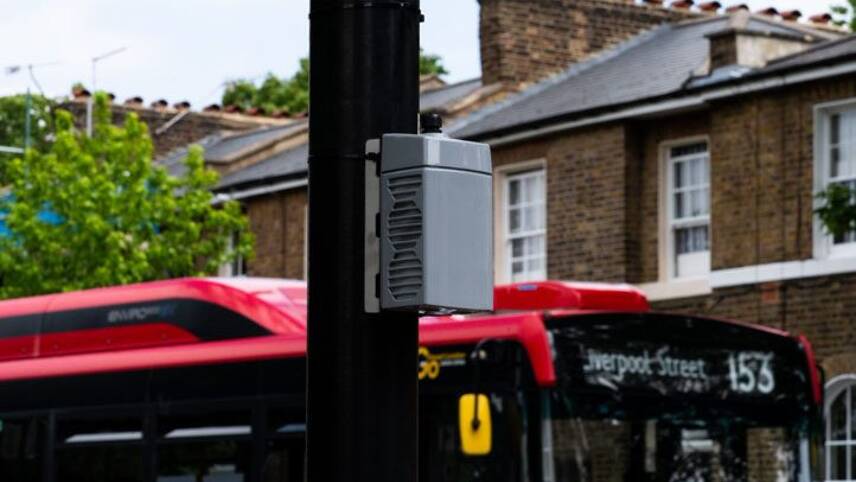Register for free and continue reading
Join our growing army of changemakers and get unlimited access to our premium content

Pictured: One of the new 'Airnode' sensors. Image: AirLabs/Greenhouse PR
The local authority has partnered with AirLabs to procure the ‘Airnode’ sensors, which refresh 60 times more frequently than the London borough’s existing network of air quality reference stations. Moreover, unlike existing sensors, the devices are capable of differentiating between common pollutents including NO2 and O3, while also measuring temperature and humidity.
Working in partnership with AirLabs and non-profit the Camden Clean Air Initiative, Camden Council will explore how the data collected from the new sensors could be conveyed to schools, hospitals, businesses, community groups and individuals.
In terms of engaging with individuals, it is hoped that the network, once fully rolled out, could be used to help members of the public map journeys using routes that avoid air pollution as much as possible. This functionality could be carried out using an app or website. There is also the potential for NHS Trusts and schools to flag routes and areas with frequently high pollution levels to vulnerable people.
Camden Council has not announced a completion date for the roll-out of the new sensors but has stated that deployment will be “rapid over the coming months”. Existing air quality reference stations will remain in place; the AirLabs Airnodes are not replacing them, but expanding the existing network.
The Camden Clean Air Initiative’s chief executive Jeffrey Young said: “During the Covid-19 [lockdowns], walking on our streets became more enjoyable as there were fewer cars on the road and less vehicle-derived pollution in the air. This flagship project aims to provide the council and our community with the data needed to get us back to that point – improving the health and wellbeing of our residents for the long-term.”
Camden Council’s cabinet member for a sustainable borough Cllr Adam Harrison added: “This project will form an important part of our work to protect public health by building a more detailed understanding of the sources of air pollution throughout Camden and the actions we can all take to reduce pollution and our exposure to it.”
Camden Council had already committed to ensuring that air quality in the borough meets the World Health Organisation’s (WHO) standards. The UK’s cities have, in recent years, frequently exceeded the WHO’s recommended limits and the current Clean Air Strategy targets are less ambitious. Ministers are planning to introduce new limits in statute by October 2022.
Many green groups have argued that the Government’s approach to tackling air pollution has been too lax.
The issue is one of public health and ethics as well as environmental impact; air pollution is estimated to contribute to 17,000 premature deaths in England each year. The recent coroner’s ruling on the death of Ella Adoo-Kissi-Debrah, who died aged nine in 2013, compelled local authorities to increase air quality monitoring and to do more to raise public awareness of the health risks from air pollution exposure in the absence of updated plans from the Government.
AirLabs is hoping that other London boroughs and other local councils will use Camden’s approach as a “blueprint”.
Thames Valley Berkshire Live Lab
Moving a little further north, telecoms giant Virgin Media O2 has announced a new partnership with the Thames Valley Berkshire Live Lab R&D hub, exploring how digital data could be used to reduce the county’s environmental impact and improve public health and wellbeing.
Under the partnership, anonymised data from the O2 mobile phone network will be collected along with data from other sources, such as air quality sensors, crowd movement monitors and road use monitors.
There are also plans to help make energy management more dynamic, unlocking the flexibility needed to add more renewable generation and electric vehicle (EV) charging points to the grid. Smarter Grid Solutions id creating a dynamic energy management platform and data from smart EV chargers will be collected, analysed and relayed to local authorities by ev.energy and Hubject.
Virgin Media O2 has stated that all data collection will “operate within strict policy guidelines” relating to personal data and privacy. The data will be used by the county’s six local authorities to develop plans for tackling air pollution, minimising traffic, updating energy infrastructure and repairing roads.
The Thames Valley Berkshire Live Lab is being funded through the ADEPT SMART Places Lives Lab Programme, which is chiefly financed by the Department for Transport (DfT) but has also secured corporate funding from O2, WSP, EY, Ringway, Keir and SNC-Lavalin’s Atkins.
Virgin Media O2’s director of market management Sergio Budkin said: “Anonymised, aggregated data about how we move around can help councils pinpoint the most congested transport routes, and show exactly which roads need improving, as well as tracking exposure to dangerous air pollution and determining how residents can make greener choices. Also, it allows local authorities to make informed improvements, cut carbon emissions and make life better for residents and businesses alike.”
The trials resulting from the partnership between Virgin Media O2 and the the Thames Valley Berkshire Live Lab will run until November.
Sarah George


Please login or Register to leave a comment.